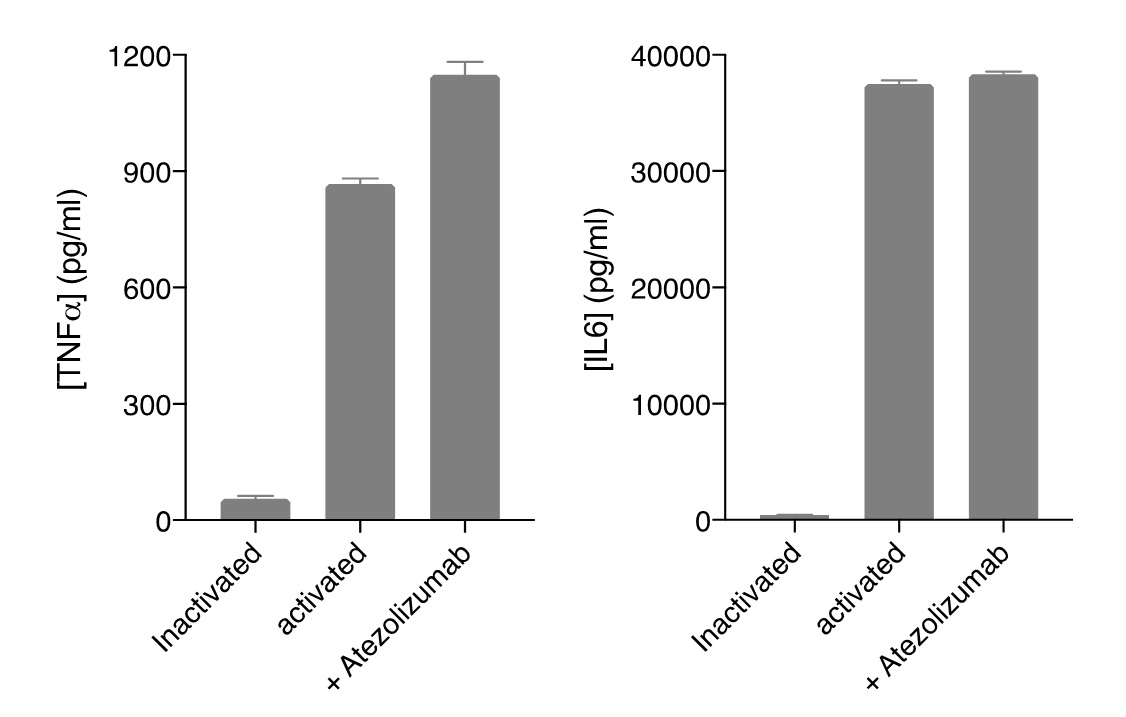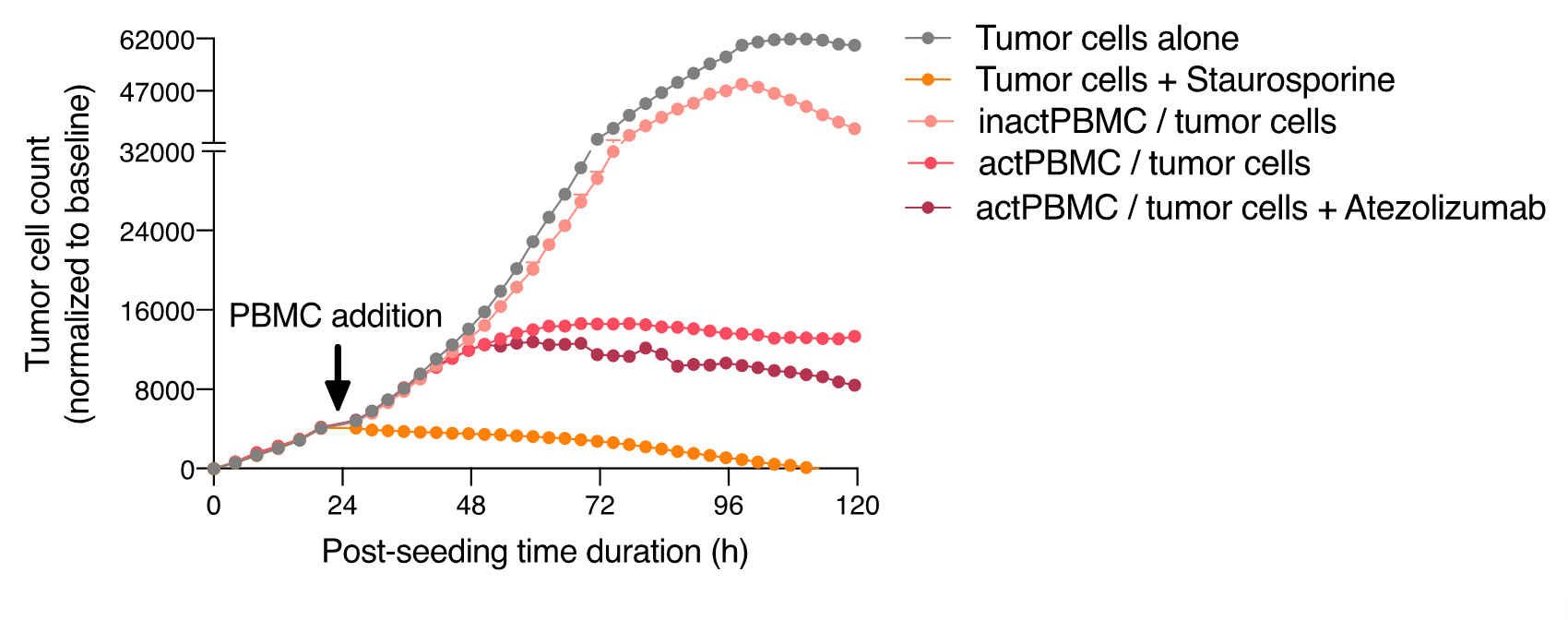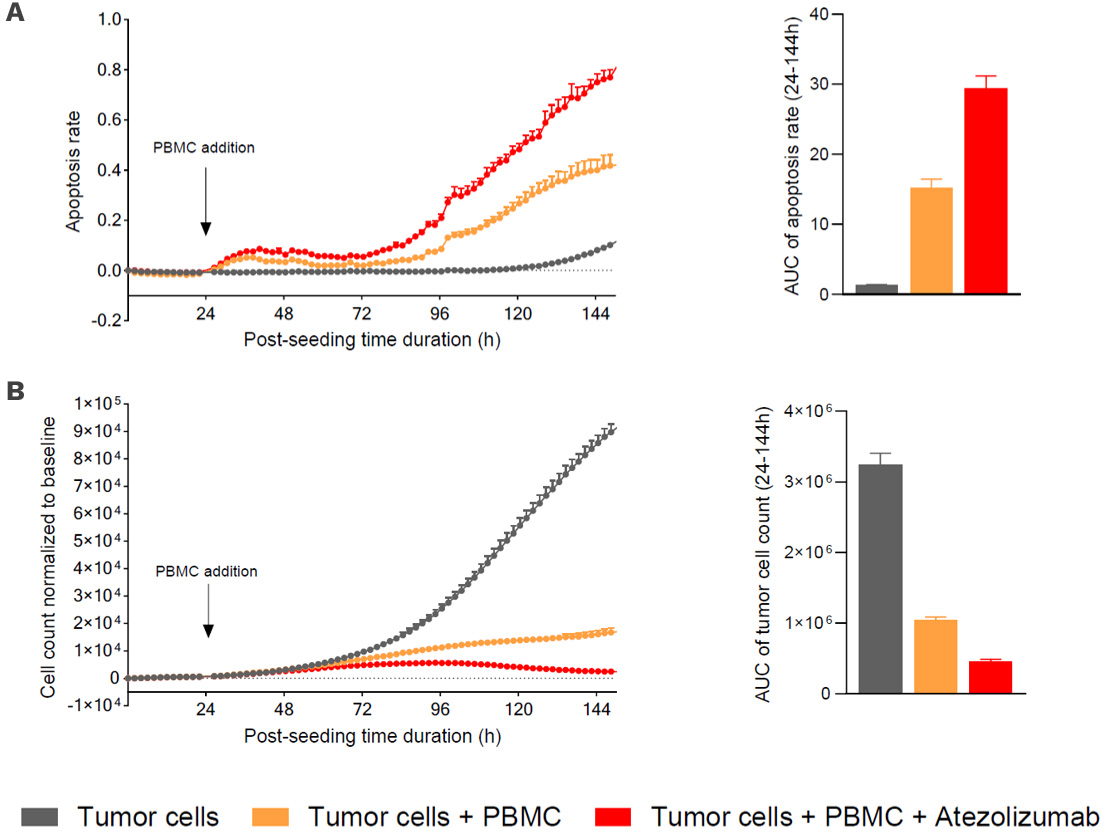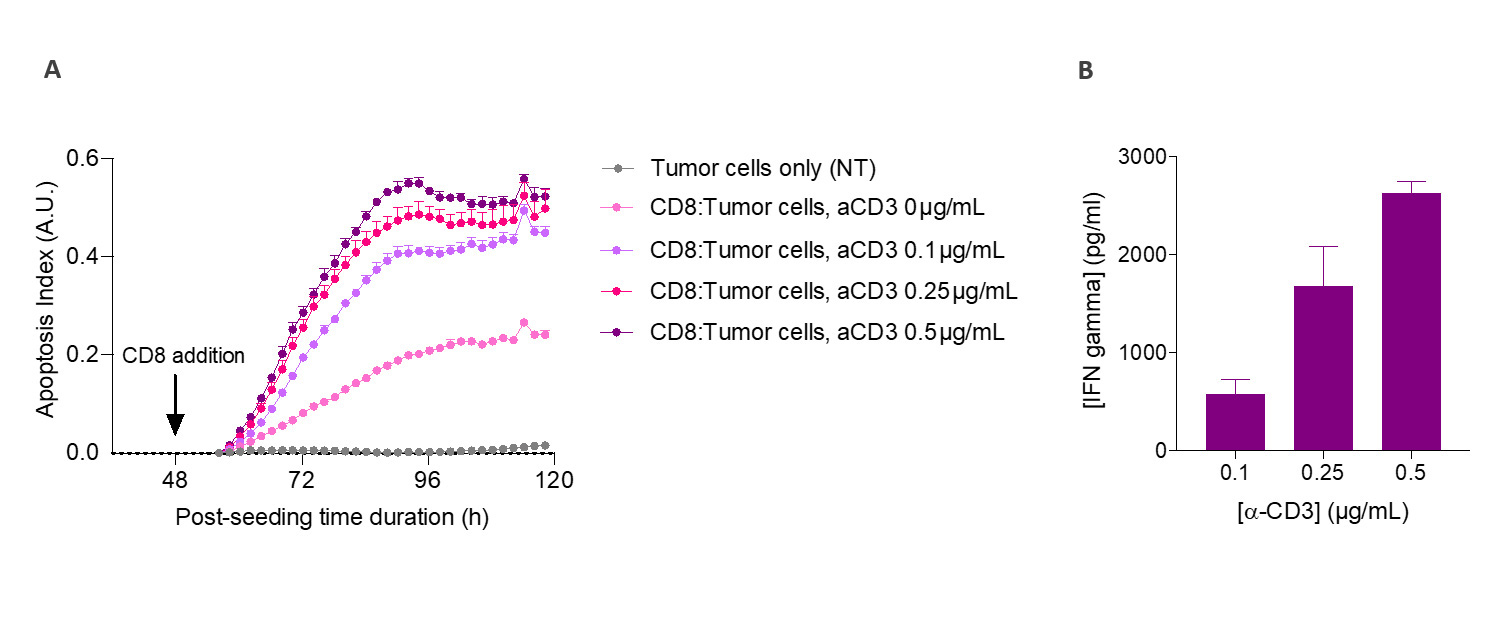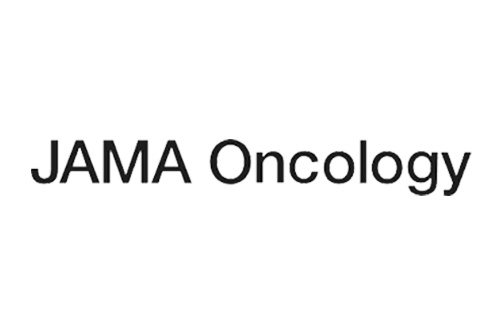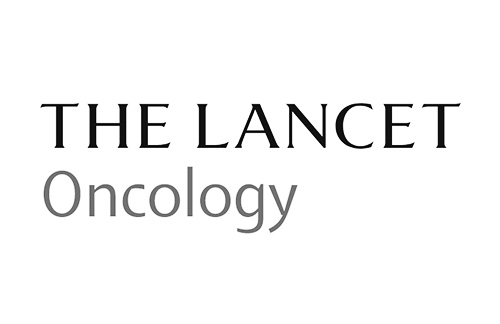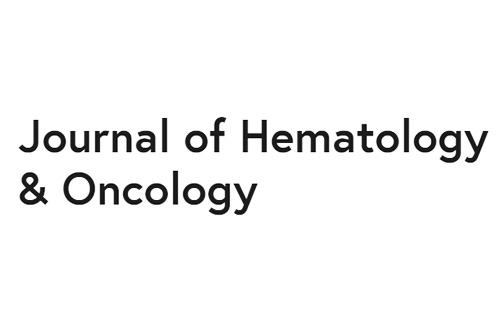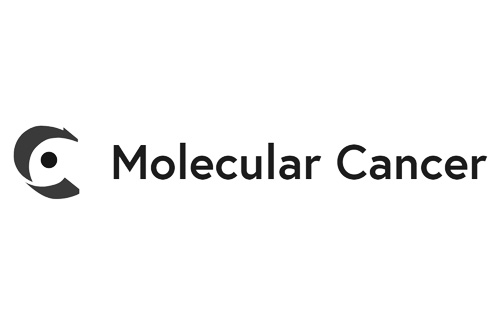The underlying question: Does your compound trigger an anti-tumor immune response, and how does it behave over time compared to (and/or in combination with) standard-of-care treatments?
- Format: 96- or 384-well plates
- Model: human tumor cells co-cultured with activated primary immune cells (PBMCs or purified T cells)
- Readouts: Tumor cell apoptosis count by live-cell imaging, and immune cell response via the capture of IFNg release
- Standards: anti-PD-L1 mAbs (Atezolizu & Avelu), anti-PD1 mAbs (Nivolu- & Pembrolizu-)
- On request: flow cytometry immunophenotyping, assessment of cytokine release, proteomics, transcriptomics
Control – 72h post-culture
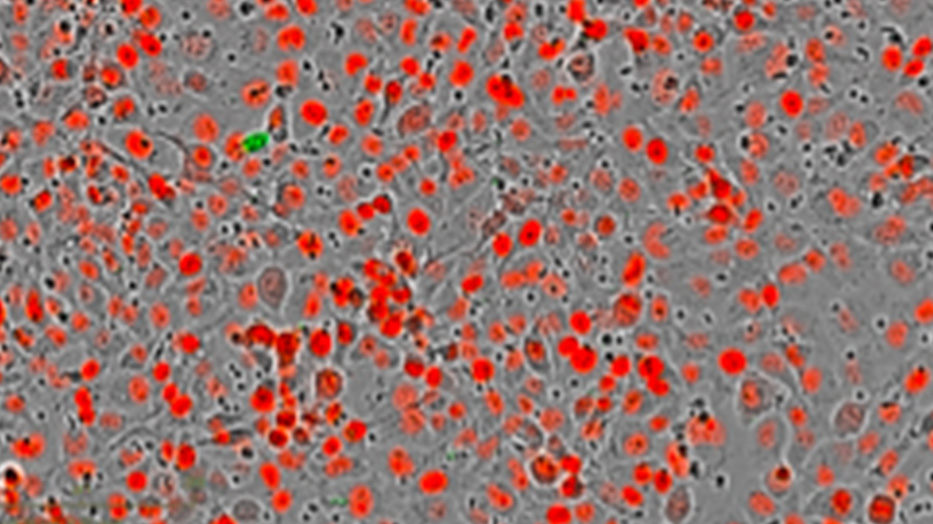
H1299 lung cancer cells co-cultured with inactivated PBMCs
Treated – 72h post-culture
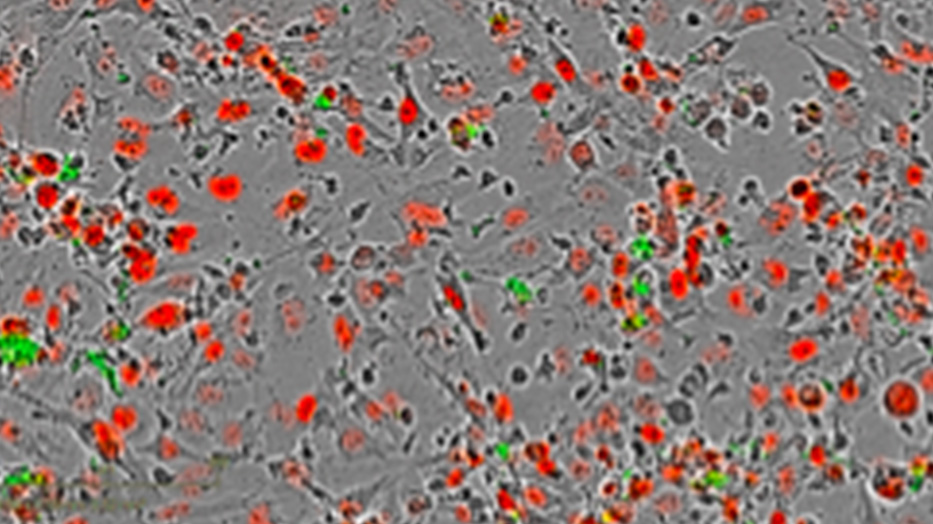
Anti-CD3 activation of PBMC enhances their killing activity toward H1299 cancer cells
Assay principle
- Treatment of immune cells with immunomodulatory therapeutics at the time of exposure to target tumor cells and initiation of co-culture
- Parallel capture of tumor & immune components:
- Real-time monitoring of tumor cell count (nuclear fluorescent probe) and tumor cell death (caspase 3/7 fluorescent reagent)
- Quantification of IFNg release – surrogate of immune cell activation
- Automated image segmentation & analysis
- Additional readouts: immunophenotyping, cytokine release, gene expression, proteomics
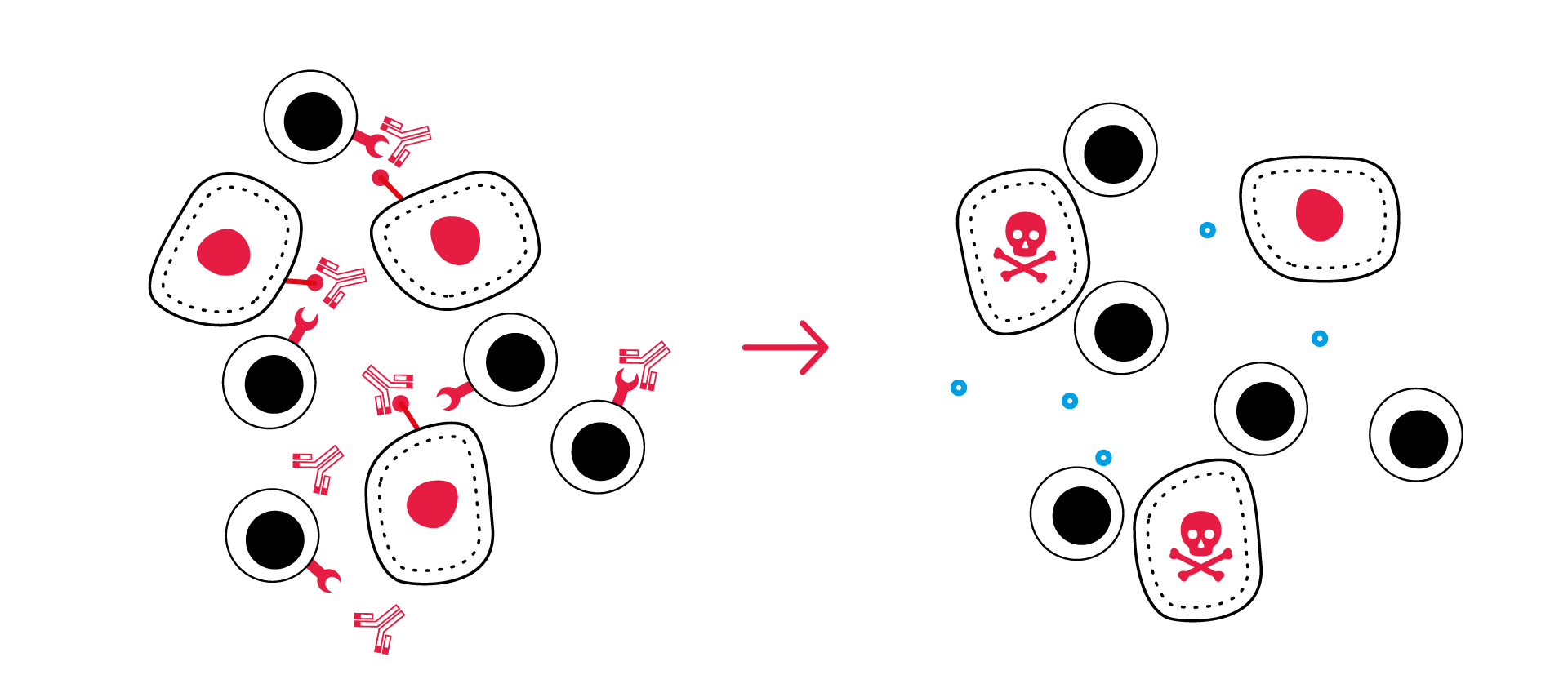
Anti-PD-L1 mAb (Atezo) promotes immune cell-mediated killing of breast MDA-MB-231 tumor cells.
MDA-MB-231 tumor cells were cultured either alone (ctrl) or with PBMCs in the presence and absence of PD-L1 inhibitor (Atezo). Supernatants were collected at 72h post-co-culture and analyzed by HTRF for TNF⍺ and IL6 release as surrogates of immune cell response (A). Tumor cell count was also kinetically monitored, normalized, and analyzed as surrogate of tumor cell proliferation and growth (B). While tumor cell exposure to activated immune cells is sufficient to induce an immune cell response against MDA-MB-231 tumor cells as illustrated by the increase of TNF⍺ levels (A) and decrease of the tumor cell number (B), Atezo is shown to further optimize the immune cell-mediated killing activity.
Activated immune cell-mediated killing of A549 lung cancer cells is enhanced by PDL1 blockade.
Lung cancer A549 cells were seeded and then co-cultured – at an appropriate E:T ratio – with activated hPBMCs, in the presence and absence of Atezo. (A) Tumor cell apoptosis was monitored over ~5 days by mean of a caspase 3/7 fluorescent probe and a NucRED probe expression, respectively, as a surrogate measure of immune cell killing activity towards tumor cells, and quantified in kinetics (left) or as AUC (right). (B) Tumor cell count was monitored as a surrogate of tumor cell proliferation, and quantified in kinetics (left) or as AUC (right).
CD8 T cell-mediated killing of A375 melanoma cells is promoted by increasing anti-CD3 concentrations
Melanoma A375 tumor cells were seeded and 48h later were co-cultured with activated CD8 cells, in the presence and absence of increasing concentrations of anti-CD3 antibody. (A) Tumor cell apoptosis was monitored and quantified over a period of ~3 days, by mean of a caspase 3/7 fluorescent probe and a NucRED probe expression, respectively, as surrogate measures of immune cell killing activity towards tumor cells. (B) IFNg released levels in the co-culture supernatants were quantified by mean of a specific HTRF detection kit. Data are expressed as means ± SEM.
Why working with Explicyte?
Experts
in Immuno-Oncology
- 100+ in vitro campaigns conducted over the past 10 years
- 30+ peer-reviewed publications in key immuno-oncology journals
- A comprehensive technology platform to decipher mechanisms of action (activation markers, signaling pathways…)
Personalized
approach
- Targeted discussion based on your request to design bespoke strategy & fit-for-purpose study proposal
- A dedicated study director (PhD level) from experimental plan to final report discussion
- Custom cellular models: over 100 human cancer cell lines available, to be cultured with target primary immune cells
Tell us about your project !

Talk to our team !
Paul Marteau, PharmD (preclinical study director), Imane Nafia, PhD (CSO), Loïc Cerf, MSc (COO), Alban Bessede, PhD (founder, CEO), Jean-Philippe Guégan, PhD (CTO)
Immune Cell Tumor Killing Assay I T cell cytotoxicity I CRO services
Explicyte Immuno-Oncology provides functional cellular assays to assess the killing efficacy of T cells and Natural Killer (NK) cells. Target tumor cell killing is measured over time, using timelapse imaging (Incucyte) and fluorescent probes to monitor tumor cell number and apoptosis. Various key immune cell subsets play an important role in mediating tumor cell death through several ways involving immune-mediated cell killing mechanisms such as T cell cytotoxicity-mediated killing and antibody-dependent cell cytotoxicity (ADCC), which result in the induction of target cell apoptosis. One of the current promising challenge in cancer immunotherapy is the potentiation of the specific elimination of tumor cells. While in vitro immune cell killing is recognized as perhaps one of the most relevant functional measures to evaluate the ability of candidate compounds or antibodies in promoting the effector immune function, many techniques have been developed and appropriate in vitro assays for the evaluation of the effectiveness of immunotherapeutics must more and more fulfill requirements in terms of high sensitivity and quantitative analysis, and should also allow the analysis of the tumor cell death occurring within days instead of hours. Explicyte is offering specialized in vitro T cell cytotoxicity-mediated killing assay and ADCC assay to evaluate the immunomodulatory function of test compounds / antibodies. Our sensitive and quantitative assays based on the use of 96-well plate co-culture of human tumor cells* and primary immune cells along with a live cell imaging platform enables the kinetic monitoring of the killing immune response towards tumor cells and thus analysis of cell death specifically within the tumor cell population. Explicyte is offering a specialized in vitro T cell cytotoxicity-mediated killing assay to evaluate the ability of test compounds to modulate the immune response of effector cell subsets. Our sensitive and quantitative assay is based on a 96-w plate co-culture of human tumor cells* and primary immune cells and consists in the kinetic monitoring of tumor cell proliferation and death thereby enabling to measure the killing immune response towards tumor cells by analyzing cell death specifically within the tumor cell population.

